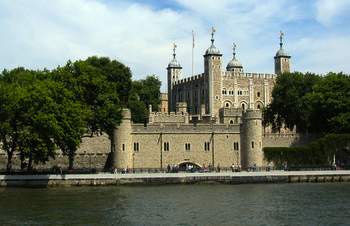- MENU
- HOME
- SEARCH
- WORLD
- MAIN
- AFRICA
- ASIA
- BALKANS
- EUROPE
- LATIN AMERICA
- MIDDLE EAST
- United Kingdom
- United States
- Argentina
- Australia
- Austria
- Benelux
- Brazil
- Canada
- China
- France
- Germany
- Greece
- Hungary
- India
- Indonesia
- Ireland
- Israel
- Italy
- Japan
- Korea
- Mexico
- New Zealand
- Pakistan
- Philippines
- Poland
- Russia
- South Africa
- Spain
- Taiwan
- Turkey
- USA
- BUSINESS
- WEALTH
- STOCKS
- TECH
- HEALTH
- LIFESTYLE
- ENTERTAINMENT
- SPORTS
- RSS
- iHaveNet.com: Travel
By Rick Steves

The Tower of London
A key to experiencing Great Britain and Ireland smartly is to embrace them not as "ye olde" destinations but as modern ones.
London is busily preparing for the 2012 Olympic Games, developing its Olympic Park site in the eastern part of the city. The con artists are getting warmed up for the big event, too -- fake one-pound coins have been seen around town. They're easy to spot. Real coins have an inscription on their outside rims while the rims on the fakes resemble tree bark.
As is the case all over Europe, access to London's public transit system has been automated. If you don't buy and use the local transit pass -- the Oyster Card -- the underground Tube will cost you far more than it should, particularly since the system's Three-Day Travelpass has been dropped.
Above ground, one of London's many free attractions -- the
New for this year, I've produced MP3 audio tours for the major sights of London:
If you want afternoon tea and scones in London but feel faint at the steep price, try the modern Teapod, near the Tower Bridge, which advertises the "best-value afternoon tea in London" for $15.
In Oxford, the
Scotland is also seeing changes in 2010.
St. Andrews will be swamped with about 100,000 visitors this summer when it hosts the British Open (July 15 to 18). Unless you're a golf pilgrim or a glutton for crowds, I recommend avoiding the town at this time. In Edinburgh, the
Across the Irish Sea, the "Celtic Tiger" enjoyed the hottest economy in the
The recession hit Waterford, in Ireland's southwest, especially hard. Until recently, Waterford was home to the largest and most respected glassworks in the world. The factory was shuttered in 2009. The famed "Waterford Crystal" is being made by cheaper labor outside of Ireland, but you can still visit the
Busy Dublin still has traffic snarls on its M-50 ring road. To ease congestion, tollbooths have been replaced with an automated tolling system. Buy an E-flow pass to cover the tolls (easiest to buy at Dublin Airport, also sold online and at retail outlets). Even if you don't have a car, the bedroom communities of Howth and Dun Laoghaire provide quieter, cheaper lodging and are just a 25-minute light-rail ride from the city center.
In Northern Ireland, former IRA prisoners will take you on a new tour of Belfast's Falls Road area -- a three-hour walk of the neighborhood from the perspective of Republicans (who'd prefer that Northern Ireland become part of the Republic of Ireland). Belfast's historic City Hall reopened last October after an $18 million renovation and once again offers wonderful guided tours of the finest interior in town. Spinning next door is the Belfast Wheel, a tall, "temporary" Ferris wheel with spectacular views. The excellent
The city of Derry has added a political mural honoring its Nobel Prize-winning local hero, John Hume -- along with Martin Luther King, Nelson Mandela and Mother Teresa. Another sign of better times: The walls of a former British army base in Derry now border a parking lot. It's a delight to stroll the streets of Northern Ireland and not need to shout above the drone of British military helicopters.
With the recent collapse of their booming economy, my Irish friends see a silver lining in the cloud. Now they can stop racing after big profits and savor the blessings of just being Irish. That's good news for travelers, too.
© Rick Steves Distributed by Tribune Media Services, Inc.
AUTOS | HOBBIES | EDUCATION | FAMILY | FASHION | FOOD & RECIPES | HOME DECOR | RELATIONSHIPS | PARENTING | PETS | TRAVEL | WOMEN
Vacation Travel - What's New in Great Britain and Ireland in 2010